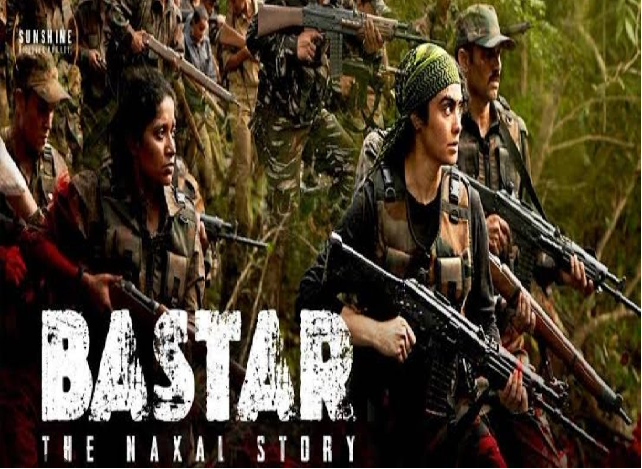
"Bastar: The Naxal Story" is a must-watch for anyone seeking to understand the complexities of the Naxalite insurgency and the heroic efforts of those who dare to defy it.
Directed by Sudipto Sen, “Bastar: The Naxal Story” is a compelling and unflinching portrayal of the Naxalite–Maoist insurgency in the Bastar district of Chhattisgarh. Led by the talented Adha Sharma in the lead role, this film delves deep into the heart of darkness, shedding light on the brutal realities faced by the innocent Adivasi and Girijan communities of forest and underdeveloped areas.
At the outset, the film grabs the viewer’s attention with its stark depiction of the relentless targeting and killing of innocent villagers by the Naxalites. The brutality and cold-blooded nature of these killings are laid bare, particularly in scenes where villagers are ruthlessly murdered for daring to sing the National anthem and hoist India’s tricolour flag. The film revolves around the harrowing story of a family torn apart by these atrocities, leaving behind a trail of grief, trauma, and vengeance.
As the patriarch of the family falls victim to Naxal violence, his wife is forced into an unthinkable act of smearing his blood on the ‘Shahid tower’ in the forest—a symbol of the ongoing cycle of violence and sacrifice. Their elder son is kidnapped and brainwashed into joining the Naxalites, while their younger daughter is sent away to school, tearing the family apart.
Amidst this turmoil, the mother, Ratna undergoes rigorous police training to join the forces and fight back against the Naxal atrocities. Adha Sharma delivers a power-packed performance, portraying the resilience and determination of a woman driven by the need for justice and revenge.
The film pulls no punches in depicting the deep-rooted hatred of the Naxals towards the Bharat, the national anthem and the tricolour, offering insights into the Maoist mindset and their relentless pursuit of power and control. It shines a spotlight on the insidious ways in which Naxal funding is sourced, including through corrupt politicians, fake NGOs, and the left-liberal ecosystem, all complicit in perpetuating the cycle of violence and exploitation.
The film pulls no punches in depicting the deep-rooted hatred of the Naxals towards the Bharat, the national anthem and the tricolour.
“Bastar: The Naxal Story” also exposes the grim reality of rural and tribal areas under Naxal control, where land records, resources, and lives are ruthlessly manipulated for personal gain. The film’s cinematic representation of a once-united family torn apart by brutality serves as a stark reminder of the human cost of conflict and greed.
As the narrative unfolds, we witness the courageous sacrifice of IPS officer Neerja Madhavan Mathur, played brilliantly by Adha Sharma, who puts her personal and family life on the line to combat the Naxal menace. With the help of a specially trained guerrilla warfare army known as ‘Salwa Judum‘, she leads a daring counterattack against the insurgents, exposing the truth and reclaiming justice for the oppressed.
“Bastar: The Naxal Story” is not merely a film; it is a powerful work about the resilience of the human spirit and the enduring struggle for justice in the face of Maoist and Naxal Atrocities. With its gripping political drama, emotional depth, and unflinching portrayal of harsh realities, this film leaves a lasting impact, urging viewers to confront uncomfortable truths and stand up against oppression.
In conclusion, “Bastar: The Naxal Story” is a must-watch for anyone seeking to understand the complexities of the Naxalite insurgency and the heroic efforts of those who dare to defy it. Sudipto Sen’s latest offering has kept up its expectations from the previously notable works including ‘The Kerala Story’. Sudipto Sen’s masterful direction, coupled with Adha Sharma’s powerhouse performance, makes this film an unforgettable cinematic experience that demands to be seen and heard.
(Nagarjuna Rao is a Business Data Analyst at Seshadripuram First Grade College Yelahanka Bengaluru)
